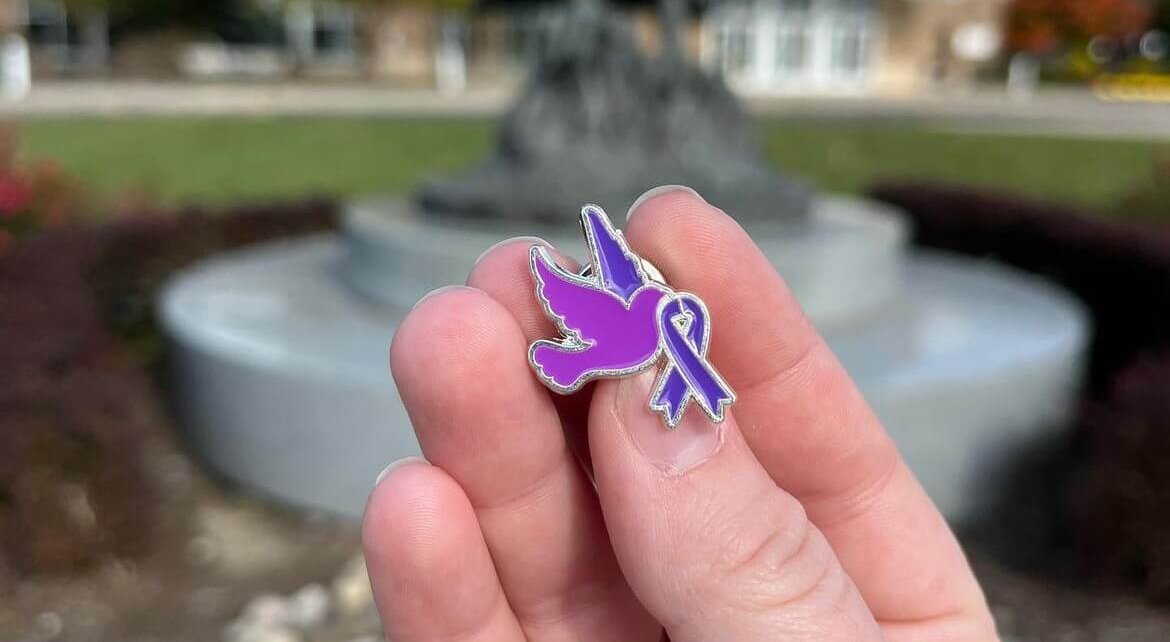October is Domestic Violence (DV) Awareness Month, as proclaimed by President Biden in 2021. The Counseling and Prevention Services (CPS) here at Monmouth acknowledged the month by hosting various on-campus events that promote awareness surrounding the topic of domestic violence.
Kristen McCarty, a clinical counselor at CPS, discussed the events CPS held on campus during the previous month. “For Domestic Violence Awareness Month,” she started, “we hosted a powerful event called ‘Step Up: Take a Stand Against DV.’ During this event, students were invited to trace their feet in chalk, symbolizing a personal commitment to help end domestic violence and support survivors.” In addition to this activity, therapy dogs were present to provide comfort and support.
McCarty continued, “Although we didn’t count attendees formally, we were very pleased with the turnout. Many students left chalk footprints and uplifting messages on the ground outside of the Student Center, creating a visible show of solidarity for those who couldn’t attend. We’re currently planning an even larger event aiming to deepen our campus and community’s commitment to domestic and sexual violence prevention and support of survivors.”
Along with these events during DV Awareness Month, CPS plans to extend the conversation on this topic throughout the school year, according to McCarty. They will be hosting a weekly workshop series called “Relationships IRL” where students will be offered a safe, supportive environment to discuss and learn about topics such as friendship, family dynamics, romantic relationships, and professional interactions. The first workshop is on Tuesday, Nov. 5, and will be held weekly on Tuesdays, except for Nov. 26. All workshops will be held in the Carol Afflitto Conference Room from 3-4 p.m. For more information, students can call CPS, stop by the office, or view the posts on Instagram (@monmouthcps).
McCarty explained that victims of DV can be any age and gender, but all types of students on college campuses are more prone to this abuse. She continued, “College-aged individuals, particularly those 18-24, are at a higher risk of experiencing intimate partner violence (IPV), whether physical, emotional, sexual, or digital. Research shows that most people who experience IPV encounter it during their college years…Research indicates that women experience DV at higher rates than men. However, DV affects all genders, including men, non-binary, and trans individuals.”
According to Connections for Abused Women and their Children (CAWC), coming forward as a DV victim is not always easy; nearly half of domestic violence cases go unreported. Signs of abuse can vary, but there are some key indicators. McCarty elaborated, “The most important first step is to believe them if they disclose they’re experiencing DV, as many people who come forward are unfortunately not believed. Behavioral changes are the most common sign—someone might become withdrawn, anxious, or more isolated from their social circles which can be an indicator of DV or other challenges. Physical signs, such as unexplained bruises or injuries, may be present in instances of physical abuse, though they may hide or downplay these. They might frequently make excuses for their partner’s behavior or appear overly concerned with keeping their partner happy, often prioritizing their partner’s needs over their own.” She continued that other signs can include checking in frequently with their partner, a strong fear of upsetting their partner, and constantly seeking their partner’s permission.
If an individual or their loved one is experiencing DV, McCarty encourages speaking up. “It is crucial for [the victim] to know that they are not alone and that support is available,” she said. “The first step is often reaching out to a trusted friend, family member, or resource to gain emotional support and help develop a safety plan. Even if they are not interested in leaving their partner, a safety plan can be crucial.”
On campus, CPS is open weekdays from 8:45 a.m. to 5 p.m. for free, confidential counseling. Walk-ins are available as well as appointments. Monmouth students also have access to UWill, a website that provides free telehealth counseling with licensed clinicians for New Jersey college students. This site grants students supplemental support outside of CPS hours, as the 30-minute sessions can be scheduled at any time. Students can register using their Monmouth University email at https://app.uwill.com/register. Additionally, students can connect with community organizations like 180 Turning Lives Around (888-843-9262) as well as national resources like the National Domestic Violence Hotline, available 24/7 at (800-799-7233) or through online chat.
McCarty concluded, “Raising awareness about DV is essential because it can severely disrupt students’ lives, mental health, safety, and academic success of students. College should be a time for growth, connection, and learning. By bringing attention to DV, we aim to create an environment where students feel supported and informed about both recognizing and addressing unhealthy relationship patterns. We want to provide students with the knowledge and resources to identify warning signs, seek help, and support their friends and peers.”




